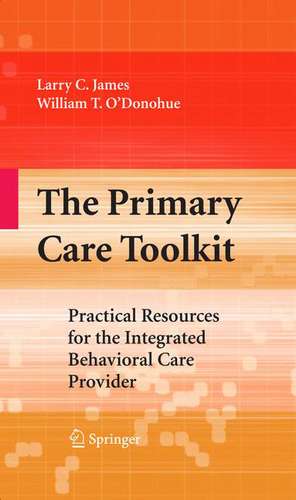The Primary Care Toolkit: Practical Resources for the Integrated Behavioral Care Provider
Editat de Larry James, William O'Donohueen Limba Engleză Hardback – 27 oct 2008
| Toate formatele și edițiile | Preț | Express |
|---|---|---|
| Paperback (1) | 657.33 lei 43-57 zile | |
| Springer – 29 oct 2010 | 657.33 lei 43-57 zile | |
| Hardback (1) | 947.42 lei 43-57 zile | |
| Springer – 27 oct 2008 | 947.42 lei 43-57 zile |
Preț: 947.42 lei
Preț vechi: 997.28 lei
-5% Nou
Puncte Express: 1421
Preț estimativ în valută:
181.28€ • 189.79$ • 150.00£
181.28€ • 189.79$ • 150.00£
Carte tipărită la comandă
Livrare economică 07-21 aprilie
Preluare comenzi: 021 569.72.76
Specificații
ISBN-13: 9780387789705
ISBN-10: 0387789707
Pagini: 333
Ilustrații: XII, 333 p.
Dimensiuni: 155 x 235 x 23 mm
Greutate: 1.47 kg
Ediția:2009
Editura: Springer
Colecția Springer
Locul publicării:New York, NY, United States
ISBN-10: 0387789707
Pagini: 333
Ilustrații: XII, 333 p.
Dimensiuni: 155 x 235 x 23 mm
Greutate: 1.47 kg
Ediția:2009
Editura: Springer
Colecția Springer
Locul publicării:New York, NY, United States
Public țintă
Professional/practitionerCuprins
Tools for Getting Started.- How to Determine the Need: A Readiness Assessment System.- What Administrators Should Know About the Primary Care Setting.- Financial Models for Integrated Behavioral Health Care.- Essential Competencies of Medical Personnel in Integrated Care Settings.- Integrated Care: Whom to Hire and How to Train.- Effective Consultative Liaison in Primary Care.- Cultural Competency in the Primary Care Setting.- The Primary Care Consultant Toolkit: Tools for Behavioral Medicine Training for PCPs in Integrated Care.- Quality Improvement in the Integrated Health Care Setting.- Behavioral Screening in Adult Primary Care.- Toolbox for Integrated Consultation-Liaison Services: Guidelines and Handouts.- The Primary Care Consultant Toolkit: Tools for Behavioral Medicine.- Assessment and Treatment of Anxiety in Primary Care.- Assessing and Managing Chronic Pain in the Primary Care Setting.- Promoting Treatment Adherence Using Motivational Interviewing: Guidelines and Tools.- Diabetes – Guidelines and Handouts.- Attention-Deficit Hyperactivity Disorder in Primary Care.- Behavioral Health Consultation for Coronary Heart Disease.- Smoking.- Pediatric Obesity.- Somatization in Primary Care.
Recenzii
From the reviews:
"For mental health professionals working in primary care settings, this guide provides advice and information on collaboration care. … James (psychology, Tripler Army Medical Center) and O’Donohue … compile 20 chapters by psychologists and other mental health professionals and physicians from the US, who address assessment and treatment guidelines for illnesses … . They also provide a review of Current Procedural Terminology codes and lists of resources for obtaining patient handouts." (SciTech Book News, March, 2009)
"For mental health professionals working in primary care settings, this guide provides advice and information on collaboration care. … James (psychology, Tripler Army Medical Center) and O’Donohue … compile 20 chapters by psychologists and other mental health professionals and physicians from the US, who address assessment and treatment guidelines for illnesses … . They also provide a review of Current Procedural Terminology codes and lists of resources for obtaining patient handouts." (SciTech Book News, March, 2009)
Notă biografică
Larry James, Ph.D, ABPP, is Chair of the Department of Psychology at Tripler Army Medical Center, Honolulu. He holds adjunct appointments at the Uniformed Services University of the Health Sciences School of Medicine, Howard University Hospital, University of West Florida, American School of Professional Psychology, University of Hawaii, and Hawaii Pacific University. He is President-elect of the American Board of Health Psychology; he is on the Board of Trustees of the American Board of Professional Psychology as well as on the Board of Directors of Division 38 (Health Psychology) of the American Psychological Association; and he is a member of the Presidential Task Force on Psychological Ethics and National Security. He is an Associate Editor on the Journal of Military Psychology (Division 19 of the American Psychological Association) and has received numerous professional, military, and athletic honors.
William T. O’Donohue, PhD is Professor of the Department of Psychology and Adjunct Professor of Psychiatry at the University of Nevada at Reno. From 1999 through 2005 he was Nicholas Cummings Professor of Organized Behavioral Healthcare Delivery at the same institution. In addition, he is Director of the Victoms of Crimes Treatment Center and the Sexual Assault Prevention and Counseling Services at University of Nevada, Reno. He is a member of the Association for the Advancement of Behavior Therapy and since 1999 has served on the Advisory Board of the Cambridge Center for Behavioral Studies. His areas of specialization are mental health service delivery, forensic psychology, human sexuality (treatment of victims and offenders), management and administration, behavior therapy, and philosophy of psychology.
William T. O’Donohue, PhD is Professor of the Department of Psychology and Adjunct Professor of Psychiatry at the University of Nevada at Reno. From 1999 through 2005 he was Nicholas Cummings Professor of Organized Behavioral Healthcare Delivery at the same institution. In addition, he is Director of the Victoms of Crimes Treatment Center and the Sexual Assault Prevention and Counseling Services at University of Nevada, Reno. He is a member of the Association for the Advancement of Behavior Therapy and since 1999 has served on the Advisory Board of the Cambridge Center for Behavioral Studies. His areas of specialization are mental health service delivery, forensic psychology, human sexuality (treatment of victims and offenders), management and administration, behavior therapy, and philosophy of psychology.
Textul de pe ultima copertă
The Primary Care Toolkit
Practical Resources for the Integrated Behavioral Care Provider
Edited by Larry James, Tripler Army Medical Center, Honolulu
and William O’Donohue, University of Nevada, Reno
I’m working in a primary care facility.
Now…what am I doing here?
Ideally, the integration of behavioral health into the medical setting brings effective, coordinated treatment and increased satisfaction for both practitioner and patient. In reality, however, the results can be far from perfect—and far from integrated. The Primary Care Toolkit introduces mental health professionals to the best possibilities for the collaboration while preparing them for the crucial differences between primary care and traditional mental health settings, to make the transition as worthwhile and non-traumatic as possible.
The editors, experts on collaborative care (and astute judges of its potentials and pitfalls), have packed the Toolkit with hands-on, evidence-based, practical information, including handouts, protocols, inventories, and reference lists. Readers will improve their medical literacy, learn how to make more effective use of the clinic’s patient education and marketing resources, and uncover key consultation skills. And chapters for primary care physicians and administrators help all parties understand the synergy underlying integrative care.
A sampling of the Toolkit’s features:
Practical Resources for the Integrated Behavioral Care Provider
Edited by Larry James, Tripler Army Medical Center, Honolulu
and William O’Donohue, University of Nevada, Reno
I’m working in a primary care facility.
Now…what am I doing here?
Ideally, the integration of behavioral health into the medical setting brings effective, coordinated treatment and increased satisfaction for both practitioner and patient. In reality, however, the results can be far from perfect—and far from integrated. The Primary Care Toolkit introduces mental health professionals to the best possibilities for the collaboration while preparing them for the crucial differences between primary care and traditional mental health settings, to make the transition as worthwhile and non-traumatic as possible.
The editors, experts on collaborative care (and astute judges of its potentials and pitfalls), have packed the Toolkit with hands-on, evidence-based, practical information, including handouts, protocols, inventories, and reference lists. Readers will improve their medical literacy, learn how to make more effective use of the clinic’s patient education and marketing resources, and uncover key consultation skills. And chapters for primary care physicians and administrators help all parties understand the synergy underlying integrative care.
A sampling of the Toolkit’s features:
- Assessment and treatment guidelines for core illnesses (chronic pain, heart disease, anxiety, depression), and issues (treatment compliance, obesity, smoking, somatization) encountered in primary care.
- Hiring and interview protocols for administrators.
- Training programs and issues.
- Financial and billing models.
- Quality management/improvementtools.
- Review of the current CPT codes.
Caracteristici
Includes evidence-based practice guidelines, fact sheets, assessment inventories, and group protocols; thus, highly practical Addresses the major clinical problems and complaints encountered in primary care settings Written by leading experts in their fields Includes supplementary material: sn.pub/extras















